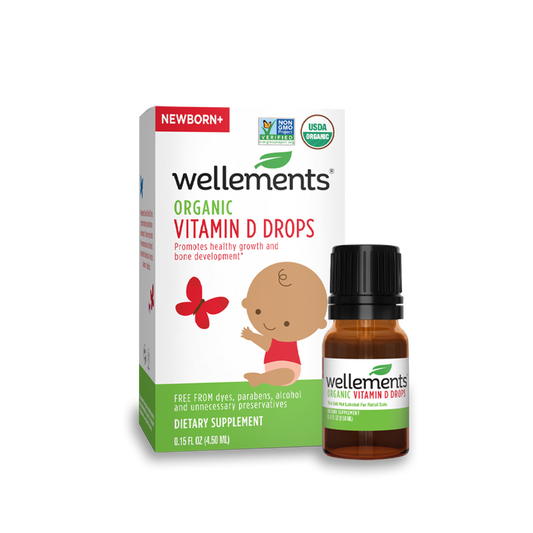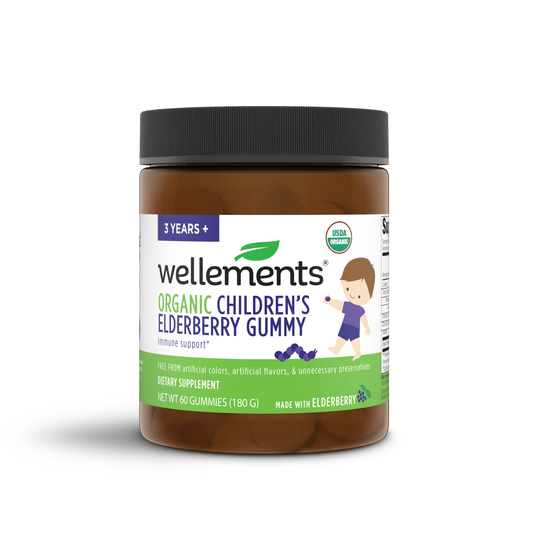Fall/Winter Newborn Essentials
| updated:Share

Babies need vitamin D to build strong bones that maintain mobility through middle age and beyond. This guide can help you get your little one off to the best possible start with this essential nutrient.
Importance Of Vitamin D For Babies During Fall/Winter
Exposure to sunlight transforms cholesterol in the body into valuable vitamin D. When the colder months come upon us, the angle of the sun's rays changes with the Earth. As a result of this changed perspective, the body's vitamin D production plummets. Compounding this effect, many children spend less time in the sun with shorter daylight hours.
In response, the Children's Hospital of Philadelphia recommends giving your baby a vitamin D supplement in the fall and winter. Even during the warmer months, dietary vitamin D through food or supplementation remains important since your little one's sensitive skin should be shielded from the sun's UV rays.

Organic Baby Vitamin D Drops
Foods and supplements certified as organic by the USDA must meet standards for additives, weed control, pest control, soil quality, and many other categories. For example, organic vitamin D drops from Wellements are formulated especially for babies' gentle tummies. They are certified as organic and free of dyes, free of dyes, parabens, alcohol, and unnecessary preservatives.
4.2 /
5.0
(86)
86
total reviews
Vitamin D Drops
Sale price
$11.99
Does My Baby Need Vitamin D Drops?
The American Academy of Pediatrics recommends a daily allowance of vitamin D by age. Infants should get at least 400 daily international units (IU) of this nutrient, and toddlers and preschoolers need at least 600 IU each day. The Institute of Medicine echoes these AAP recommendations, starting in the first few days of life for breastfed and formula-fed babies.
Vitamin D facilitates calcium absorption, a necessity for strong, healthy bones. Lack of vitamin D during childhood can lead to rickets, a condition that leads to soft, underdeveloped bones. Children who don't get enough vitamin D also have a higher risk of fractures and may experience compromised growth.

Best Vitamin D Drops For Your Baby
Wellements make organic vitamin D drops for your baby, formulated to be free of Preservatives, Gluten, Parabens, Artificial Colors, Artificial Flavors, and Top 8 Allergens. You only need a small dose to provide the American Academy of Pediatrics' recommended daily allowance of infant vitamin D.
Other Fall/Winter Must-Haves For Your Baby
If you'll have an infant during the cool, crisp months of the year, preparing for the elements with the right clothing items and necessities is essential. Experienced parents recommend this tried-and-true list to make sure you have what you need without going overboard:
- Several swaddle blankets (until your baby reaches 3 to 4 months when they double as burp cloths or breastfeeding covers)
- Soft fleece sleep sacks
- Warm crib sheets made from cozy flannel or organic cotton
- A travel system with a car seat that pops right into a stroller base for safe, convenient drives and winter walks
- A snuggly car seat cover that fits over the infant carrier
- Babywearing harness or carrier so your little one can remain toasty as you stroll the neighborhood or get things done at home
- A padded playmat for indoor fun when the sun just won't come out
- A humidifier to help ward off germs that cause cold-weather colds
- Warm, soft onesie pajamas
- Toasty mittens, booties, and hats
- A bottle warmer so you can serve milk or formula at the perfect temp in seconds

With this guide, you'll have everything your baby needs for a warm and wonderful first fall and winter--including a healthy dose of daily vitamin D.
References
https://www.chop.edu/news/health-tip/vitamin-d-supplements-what-parents-should-know
https://www.npr.org/sections/health-shots/2015/12/21/459971906/with-winter-here-many-kids-could-use-vitamin-d-supplements
https://www.usda.gov/media/blog/2012/03/22/organic-101-what-usda-organic-label-means
https://health.clevelandclinic.org/do-babies-really-need-vitamin-d-supplements/



